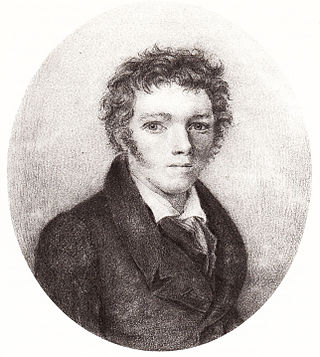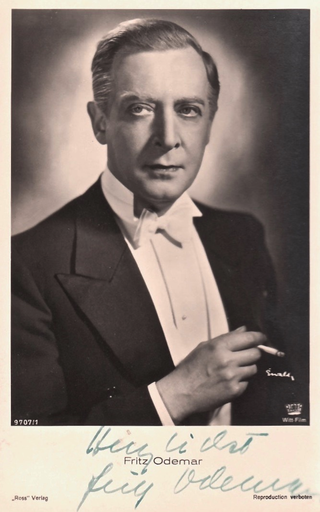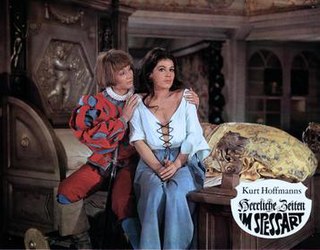
Spessart is a Mittelgebirge, a range of low wooded mountains, in the States of Bavaria and Hesse in Germany. It is bordered by the Vogelsberg, Rhön and Odenwald. The highest elevation is the Geiersberg at 586 metres above sea level.

Wilhelm Hauff was a Württembergian poet and novelist.

Juan Carlos Mundin-Schaffter, known as Carlos Thompson, was an Argentine actor.
Hans Clarin was a German actor. He became a well-known voice actor of characters in children audio plays, particularly the kobold Pumuckl, the German voice of René Goscinny and Albert Uderzo's diminutive Gaulish hero Asterix, and the ghost Hui Buh.

Liselotte Pulver, sometimes credited as Lilo Pulver, is a Swiss actress. Pulver was one of the biggest stars of German cinema in the 1950s and 1960s, where she often was cast as a tomboy. She is well known for her hearty and joyful laughter. Her films outside of German cinema include A Time to Love and a Time to Die (1958), One, Two, Three (1961) and The Nun (1966).

Mespelbrunn is a community in the Aschaffenburg district in the Regierungsbezirk of Lower Franconia (Unterfranken) in Bavaria, Germany and a member of the Verwaltungsgemeinschaft of Mespelbrunn, whose seat is in Heimbuchenthal.

Weibersbrunn is a community with a population of close to 2,000 in the Aschaffenburg district in the Regierungsbezirk of Lower Franconia (Unterfranken) in Bavaria, Germany.

Mespelbrunn Castle is a late-medieval/early-Renaissance moated castle on the territory of the town of Mespelbrunn, between Frankfurt and Würzburg, built in a tributary valley of the Elsava valley, within the Spessart forest. It is a popular tourist attraction and has become a famous Spessart landmark.

Herbert Hübner was a German stage and film actor. He appeared in more than 150 films between 1921 and 1966. He was born in Breslau, Germany and died in Munich, Germany.
Rudolf Fernau was a German film actor. He appeared in 53 films between 1936 and 1982. He was born and died in Munich, Germany. After the World War II, Fernau, a Nazi Party member, was sentenced to nine months in prison and a lifelong ban from working by a denazification tribunal. On appeal, however, Fernau's sentence was reduced to a small fine.

Fritz Odemar was a German film actor. He appeared in more than 150 films between 1927 and 1955. He was born in Hannover, Germany and died in Munich, West Germany. Odemar's father was the actor Fritz Odemar Sr..

Hubert "Hubsi" von Meyerinck was a German film actor. He appeared in more than 280 films between 1921 and 1970.
Kurt Hoffmann was a German film director, the son of Carl Hoffmann. He directed 48 films between 1938 and 1971. He ran a production company Independent Film along with Heinz Angermeyer.

Wolfgang Neuss was a German actor and Kabarett artist. Wolfgang Neuss and Wolfgang Müller (1922–1960) were a popular double act. Beginning in the mid-1960s, Neuss also became famous for his political engagement, first for the SPD, then for the extra-parliamentary opposition, APO. He died in 1989 from a longtime cancer.

The Haunted Castle is a 1960 West German comedy horror film directed by Kurt Hoffmann. It was entered into the 2nd Moscow International Film Festival where it won the Silver Prize. The film is a sequel to The Spessart Inn (1958) and was followed by Glorious Times at the Spessart Inn (1967). It was shot at the Bavaria Studios in Munich. The film's sets were designed by the art directors Hein Heckroth and Willy Schatz.
Georg Witt was a Russian-born German film producer. Born in Moscow he moved to Germany at a young age. He produced around forty films, including the 1955 Liselotte Pulver comedy I Often Think of Piroschka. He was the second husband of the actress Lil Dagover.
Robert Herlth was a German art director. He was one of the leading designers of German film sets during the 1920s and 1930s.
The Spessart Inn is a 1923 German silent film directed by Adolf Wenter. In 1958 it was remade as a musical film of the same title.

The Beautiful Adventure is a 1959 West German comedy film directed by Kurt Hoffmann and starring Liselotte Pulver, Robert Graf and Bruni Löbel.

Glorious Times at the Spessart Inn is a 1967 West German comedy film directed by Kurt Hoffmann and starring Liselotte Pulver, Harald Leipnitz, and Vivi Bach.














